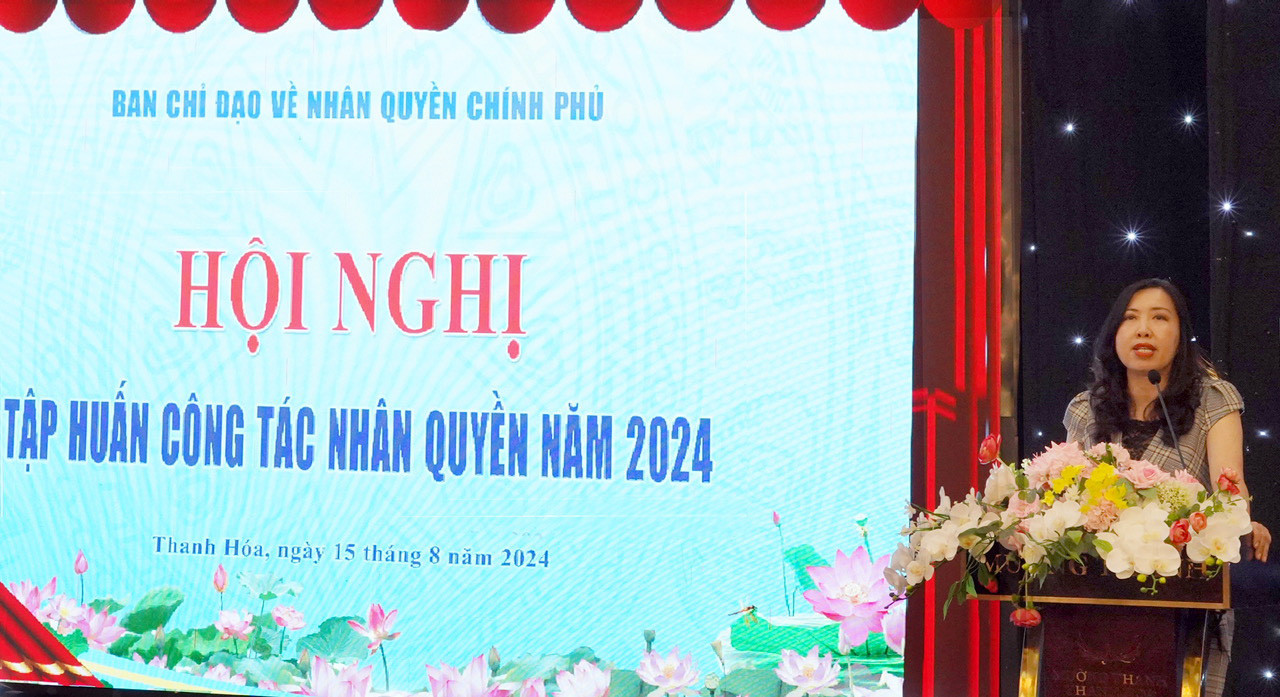On August 15, the Government's Human Rights Steering Committee, in collaboration with the Thanh Hoa Provincial Human Rights Steering Committee, organized the 2024 National Human Rights Training Workshop in Thanh Hoa City.
The workshop aimed to assess global, regional, and domestic trends related to Vietnam’s human rights efforts, identify challenges directly impacting human rights protection and advocacy, and propose key solutions for the coming period.

The event was attended by over 350 delegates, including Dao Thanh Tung, Vice Chairman of Thanh Hoa Provincial People’s Committee; Le Thi Thu Hang, Deputy Minister of Foreign Affairs; Lieutenant General Dang Xuan Hong; and representatives from various government bodies and local human rights committees across 28 provinces and cities.
The workshop was held against the backdrop of Vietnam's growing recognition for its significant achievements in safeguarding and promoting human rights domestically and internationally. As a member of the UN Human Rights Council (2023–2025), Vietnam has made proactive, responsible contributions while fulfilling its commitments to international human rights conventions.
Despite challenges, Vietnam continues to prioritize socio-economic development, ensuring livelihoods, improving quality of life, and strictly adhering to its international human rights commitments. The country successfully defended its Universal Periodic Review (UPR) report and reports on implementing international human rights conventions.

Vietnam’s dialogues with key partners, including the US, EU, and Australia, have yielded substantive results, contributing to upgraded diplomatic relations, such as the Vietnam-US Comprehensive Strategic Partnership. These dialogues affirmed Vietnam’s commitment to human rights and bolstered its international standing.
In his opening remarks, Lieutenant General Dang Xuan Hong highlighted the complex global and regional developments in 2024 that pose challenges to human rights efforts. Vietnam, midway through its UN Human Rights Council term, will focus on fostering dialogue, cooperation, and fulfilling commitments as it prepares to reapply for the 2026–2028 term.
However, adversarial forces are expected to intensify misinformation campaigns accusing Vietnam of human rights violations, especially concerning ethnic, religious, and labor issues. This calls for persistent efforts across the political system to counteract such activities and maintain Vietnam’s reputation.
Vice Chairman Dao Thanh Tung emphasized the workshop's role in updating local authorities on the latest human rights developments, unifying perspectives from central to local levels, and sharing practical experiences to address challenges.
The workshop featured presentations on:
Strengthening external communications on human rights.
Responding to hostile misrepresentations on international platforms.
Addressing the misuse of religious and democratic freedoms by adversarial forces.
Vietnam’s commitments to next-generation free trade agreements.
In his closing remarks, Major General Nguyen Van Ky, Deputy Chief of the Standing Office of the Human Rights Steering Committee, outlined key tasks for local committees:
Develop comprehensive socio-economic policies to reduce poverty, enhance social welfare, and support vulnerable groups, ensuring ethnic and religious freedoms.
Neutralize adversarial propaganda exploiting democracy and human rights issues, particularly during critical political events, and address emerging religious, ethnic, and labor-related tensions effectively.
Engage with international NGOs to attract resources for economic development and social problem-solving.
Strengthen responsibility at the grassroots level, ensuring timely and effective human rights solutions and contributing to broader socio-economic goals.
The workshop concluded with a call for enhanced coordination and proactive measures to ensure sustainable human rights progress across all levels of government.
PV